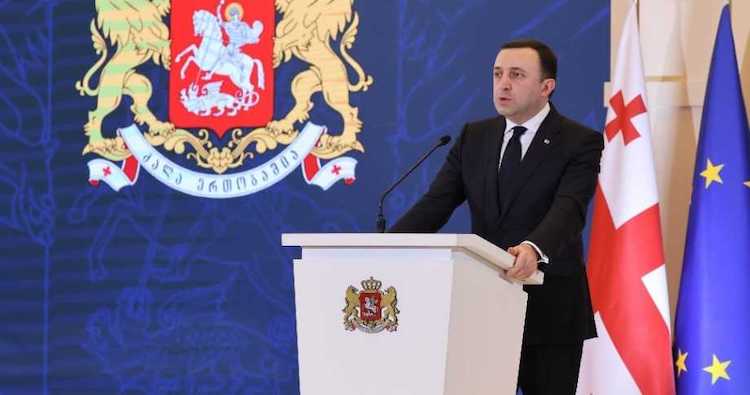PM: “not a single fact” of Georgia used for sanctions evasion has been identified

Georgian Prime Minister Irakli Garibashvili on Monday said domestic authorities had prevented “1,000 cases” of attempts of evasion of the international sanctions. Photo: Gov't Administration
Georgian Prime Minister Irakli Garibashvili on Monday said domestic authorities had prevented “1,000 cases” of attempts of evasion of the international sanctions imposed on Russia for its invasion of Ukraine, with “not a single fact” of their successful circumvention identified in the country.
In his end-of-year report in Tbilisi on the work of the Government, Garibashvili said the authorities “identified all such threats in a timely manner [of] products that were sent from Europe to Russia, and we immediately informed our European colleagues about these attempts”.
He added the Government had “worked as openly and transparently as possible, and we will continue to do so in the future” on the issue, extending his gratitude to Finance Minister Lasha Khutsishvili and agencies of his office for “timely prevention” of attempts of evasion of the sanctions.
Garibashvili claimed his Government’s decisions were “based on the national interests of our country” and “interests of our people”, and served the goal to avoid “damaging” domestic economic growth, while also ensuring measures against attempts of evasion of sanctions so that “no question has arisen from any of our partner countries”.
[W]e have heard many unfair, baseless accusations [of the territory of Georgia being used for evasion of the sanctions], which have also been disproved during the visit of a high-level delegation a few months ago”, Garibashvili said in reference to the visit of sanction enforcement officials from the European Union, the United Kingdom and the United States in June.
The visiting delegation highlighted the Government’s “great job” in preventing circumvention of the sanctions in their assessments.
- EU, UK, US sanctions officials highlight Georgian Gov’t’s “great job” in preventing circumvention of Russian sanctions in Tbilisi visit
- US sanctions official: Georgian Gov’t “has done great job” in preventing sanctions evasion
Garibashvili noted James O'Brien, the Head of the Office of Sanctions Coordination in the US and David O’Sullivan, the EU Sanctions Envoy, had “openly, publicly” said they were “satisfied” with the “effective” system in the enforcement of the sanctions created by the Government.
He also said his Government had been coordinating with international partners ”24 hours a day” on the issue, adding the country’s “real supporters” were kept “fully informed” about domestic policies and had “no more questions” regarding the enforcement of the sanctions.
 Tweet
Tweet  Share
Share